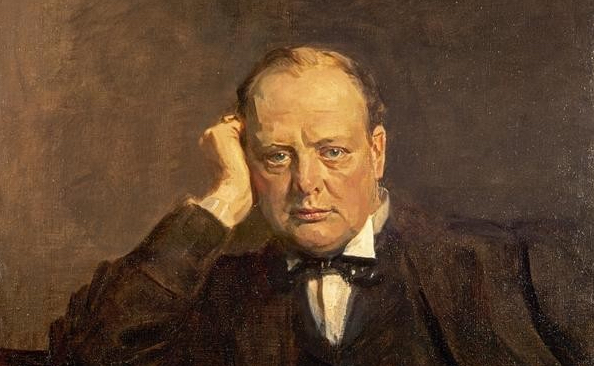
Hillsdale Dialogues Explore Churchill’s “The World Crisis”
Excerpted from “The World Crisis: Churchill’s Masterwork (1),” written for the Hillsdale College Churchill Project. For the original article with more links and images, click here. To subscribe to weekly articles from Hillsdale-Churchill, click here, scroll to bottom, fill in your email in the box entitled “Stay in touch with us.” Your email address always remains a riddle wrapped in a mystery inside an enigma.
The World Crisis Hillsdale Dialogues
The Hillsdale Dialogues are weekly broadcasts of discussions between Hillsdale College President Larry P. Arnn and radio host Hugh Hewitt. They currently offer an extended discussion of Churchill’s The World Crisis: his outstanding memoir of the First World War.
Upon publication in 1923, the first two volumes drew close attention. Churchill’s colleague Arthur Balfour (who quite admired it) referred to “Winston’s magnificent autobiography, disguised as a history of the universe.” A century later, Dr. Arnn considers it one of Churchill’s best works. It ranks with Marlborough and The Second World War for its lyrical style and powerful message. Chancing across Volume 1, 1911-1914, he marveled at the beauty of the writing and the somber warning Churchill conveyed.
Mr. Hewitt, for his part, considers The World Crisis a baleful portent of a world not unfamiliar now. He asks, does reading this great work make you pessimistic today? “No,” replies Dr. Arnn. “It’s a glorious story. Churchill is good proof against trouble. He always expected war to be hell. And he always expected to prevail. One must reason about that, of course—but one must cultivate the attitude.”
What follows is a modest accompaniment to these important Dialogues, which are worth one’s time. Discussions of the early chapters proceed at this writing. The links appear here as the sessions continue.
Availability
Many connoisseurs of Churchill and the Churchill style, who found him through The Second World War or A History of the English-Speaking Peoples, soon learned of his earlier, multi-volume memoir of the First World War. Published 1923-31 by Thornton Butterworth, Scribners and Macmillan of Toronto, it was an immediate best-seller.
Abridgments began as early as 1931, but for many years a complete set was obtainable only in the early editions. (The 1963-64 Scribners illustrated edition had a small press run and was harder to find than the originals.) In 1991, I persuaded the Easton Press to issue a complete edition with the postwar Scribners illustrations. Later, booksellers offered an inexpensive complete text by combining the unabridged 1939 Odhams two-volume edition (covering 1911-18) with two volumes Odhams did not publish: The Aftermath and The Eastern Front (from theCollected Works)
Today, availability is much better, and prices considerably lower. Bloomsbury publishes the six books as paperbacks, while Rosetta offers e-books. See Amazon.com. For earlier editions, search Bookfinder.
The volumes
Though commonly described as a six-volume work, The World Crisis is actually five volumes in six books. The middle two volumes, subtitled 1916-1918, sold as a pair, slipcased together in the USA and Canada. The fastidious refer to them as “Volumes 3a and 3b.” Thus the last two volumes, The Aftermath and The Eastern Front, are correctly Volumes 4 and 5 respectively. Booksellers describe the full set as “5-in-6.”
Volume 1, 1911-1914, begins with the great power rivalries that led to the war, and the opening campaigns. Volume 2, 1915, is the most personal, largely devoted to Churchill’s failed efforts to break the deadlock in Europe by forcing the Dardanelles, knocking Turkey out of the war and succoring the Russians. The third volume, 1916-1918 (two parts) covers the carnage on the Western Front, the German victory over Russia, Germany’s near-victory over the Allies in 1918, and the final, exhausted end of the war. Volume IV, The Aftermath, chronicles events involving Churchill during the ten years after victory, including the Irish Treaty. The final Volume V, The Eastern Front, recounts the titanic battles between Russia and the German-Austrian armies.
It is important to note two major additions not in the original text. In 1931 for a one-volume abridgment, Churchill added extensive commentary on the Battle of the Marne (1914) and Lord Fisher’s resignation (1915). Be sure to read these in the 1931 abridged one-volume edition or the unabridged 1939 Odhams two-volume edition (both covering 1911-18 only), or modern editions (such as the Kindle e-book) which incorporate these vital additions.
The World Crisis: An Appreciation
Asked to recommend a “big work” by Churchill, I always suggest The World Crisis. Like all of his war books where he was involved, it a personal testimony, tending to defend his role in affairs. But one of his worthy characteristics was his unabashed honesty: he learned from his mistakes and was forthright in admitting them. He stoutly defended the personal approach. He declared it was “not history, but a contribution to history.” Later, of The Second World War, he would say similarly, “This is not history; this is my case.”
It is hard to think of another 20th Century statesman who not only spent most of the two World Wars in high office and was able to write about them in beautiful prose. Even those who do not usually read war books admire Churchill’s account of the awful, unfolding scene. The “war to end wars” is described as if the reader were a colleague, observing the march of events over Churchill’s burly shoulder.
The virtues Churchill honors are, awfully, those of the peoples smashed in the general wreckage. It is above all to demonstrate how the chronic infirmity of political and military command made them suffer as they did that Churchill writes this history.
“Are you quite sure?”
Among the grand passages of Volume 1 was a favorite of the late General Colin Powell, who asked for its attribution (pages 48-49 of the first edition). Churchill is describing the Agadir Crisis when, amid calm, diplomatic messages, Germany and France almost went to war in 1911. Agadir was a stark warning not lost on Britain, and propelled Churchill to the Admiralty. It summarizes General Powell’s prudence about resort to arms, something he shared with Churchill:
So now the Admiralty wireless whispers through the ether to the tall masts of ships, and captains pace their decks absorbed in thought. It is nothing…. It is too foolish, too fantastic to be thought of in the twentieth century. Or is it fire and murder leaping out of the darkness at our throats, torpedoes ripping the bellies of half-awakened ships, a sunrise on a vanished naval supremacy, and an island well-guarded hitherto, at last defenceless? No, it is nothing. No one would do such things. Civilization has climbed above such perils. The interdependence of nations in trade and traffic, the sense of public law, the Hague Convention, Liberal principles, the Labour Party, high finance, Christian charity, common sense have rendered such nightmares impossible. Are you quite sure? It would be a pity to be wrong. Such a mistake could only be made once—once for all.
“The Vials of Wrath”
 In the first Hillsdale dialogue on The World Crisis Dr. Arnn examines Churchill’s arresting first chapter, “The Vials of Wrath.” Here, he realized on his first encounter, was something out of the ordinary. A great writer was setting a dramatic stage. This quotation is the best possible argument for reading The World Crisis:
In the first Hillsdale dialogue on The World Crisis Dr. Arnn examines Churchill’s arresting first chapter, “The Vials of Wrath.” Here, he realized on his first encounter, was something out of the ordinary. A great writer was setting a dramatic stage. This quotation is the best possible argument for reading The World Crisis:
It was the custom in the palmy days of Queen Victoria for statesmen to expatiate upon the glories of the British Empire, and to rejoice in that protecting Providence which had preserved us through so many dangers and brought us at length into a secure and prosperous age. Little did they know that the worst perils had still to be encountered and that the greatest triumphs were yet to be won….
It seemed inconceivable that the same series of tremendous events through which since the days of Queen Elizabeth we had three times made our way successfully, should be repeated a fourth time and on an immeasurably larger scale. Yet that is what has happened, and what we have lived to see.
“Fearful agencies of destruction”
The Great War through which we have passed differed from all ancient wars in the immense power of the combatants and their fearful agencies of destruction, and from all modern wars in the utter ruthlessness with which it was fought….
Every outrage against humanity or international law was repaid by reprisals often on a greater scale and of longer duration. No truce or parley mitigated the strife of the armies. The wounded died between the lines: the dead mouldered into the soil. Merchant ships and neutral ships and hospital ships were sunk on the seas and all on board left to their fate, or killed as they swam. Every effort was made to starve whole nations into submission without regard to age or sex. Cities and monuments were smashed by artillery. Bombs from the air were cast down indiscriminately. Poison gas in many forms stifled or seared the soldiers. Liquid fire was projected upon their bodies. Men fell from the air in flames, or were smothered, often slowly, in the dark recesses of the sea. The fighting strength of armies was limited only by the manhood of their countries….
When all was over, Torture and Cannibalism were the only two expedients that the civilized, scientific, Christian States had been able to deny themselves: and these were of doubtful utility.
Further reading
“Wikipedia: Churchill’s War Accounts: History or Memoirs?” (2022)






